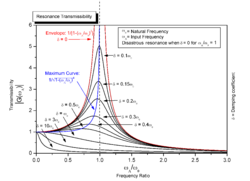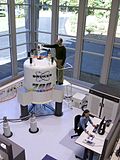mechanics, the spin–orbit interaction (also called spin–orbit effect or spin–orbit coupling) is a relativistic interaction of a particle's spin with its motion...
29 KB (4,420 words) - 23:45, 23 May 2025
mechanics, orbital resonance occurs when orbiting bodies exert regular, periodic gravitational influence on each other, usually because their orbital periods...
99 KB (10,602 words) - 07:56, 26 June 2025
Tidal locking (redirect from Spin-orbit resonance)
for every two revolutions around the Sun, a 3:2 spin–orbit resonance. In the special case where an orbit is nearly circular and the body's rotation axis...
47 KB (5,088 words) - 07:37, 11 June 2025
angular momenta despite having no orbital angular momentum. The relativistic spin–statistics theorem connects electron spin quantization to the Pauli exclusion...
72 KB (10,585 words) - 12:29, 7 June 2025
Angular momentum coupling (redirect from Orbit-orbit coupling)
orbit and spin of a single particle can interact through spin–orbit interaction, in which case the complete physical picture must include spin–orbit coupling...
17 KB (2,234 words) - 20:44, 9 June 2025
Mercury (planet) (redirect from Mercury's orbit)
(58.65 Earth days) are in a 3:2 ratio. This relationship is called spin–orbit resonance, and sidereal here means "relative to the stars". Consequently, one...
156 KB (16,140 words) - 18:46, 27 June 2025
Electron paramagnetic resonance (EPR) or electron spin resonance (ESR) spectroscopy is a method for studying materials that have unpaired electrons. The...
52 KB (7,148 words) - 12:04, 25 May 2025
ms. The two spin quantum numbers s {\displaystyle s} and m s {\displaystyle m_{s}} are the spin angular momentum analogs of the two orbital angular momentum...
22 KB (2,972 words) - 05:15, 26 May 2025
dipole spin resonance (EDSR) is a method to control the magnetic moments inside a material using quantum mechanical effects like the spin–orbit interaction...
22 KB (3,241 words) - 18:26, 23 February 2025
energy. Resonance phenomena occur with all types of vibrations or waves: there is mechanical resonance, orbital resonance, acoustic resonance, electromagnetic...
60 KB (7,937 words) - 08:40, 13 June 2025
The Dresselhaus effect is a phenomenon in solid-state physics in which spin–orbit interaction causes energy bands to split. It is usually present in crystal...
5 KB (753 words) - 19:20, 22 April 2025
case of two electrons occupying the same orbital, the Pauli principle demands that they have opposite spin. Necessarily this is an approximation, and...
35 KB (4,393 words) - 02:25, 5 June 2025
Retrograde and prograde motion (redirect from Retrograde orbit)
not tidally locked because it has entered a 3:2 spin–orbit resonance due to the eccentricity of its orbit. Mercury's prograde rotation is slow enough that...
42 KB (4,754 words) - 06:00, 1 June 2025
Axial tilt (redirect from Equatorial inclination to orbit)
Alexandre C.M; Laskar, Jacques (2009). "Mercury's capture into the 3/2 spin-orbit resonance including the effect of core-mantle friction". Icarus. 201 (1): 1–11...
32 KB (3,070 words) - 01:25, 5 June 2025
orbit, and calculations suggest that this would continue for about 50 billion years. By that time, Earth and the Moon would be in a mutual spin–orbit...
38 KB (4,679 words) - 21:56, 14 June 2025
In chemistry, orbital hybridisation (or hybridization) is the concept of mixing atomic orbitals to form new hybrid orbitals (with different energies,...
33 KB (3,204 words) - 20:53, 19 May 2025
Pluto (redirect from Hadeocentric orbit)
periodically brings it closer to the Sun than Neptune, but a stable orbital resonance prevents them from colliding. Pluto has five known moons: Charon,...
167 KB (14,550 words) - 03:44, 27 June 2025
magnetic resonance techniques, such as electron spin resonance (ESR or EPR) and, more closely, nuclear magnetic resonance (NMR). Muon spin spectroscopy...
22 KB (3,243 words) - 21:12, 16 May 2024
compounds are well described by resonance hybrids as well as by delocalised orbitals in molecular orbital theory. Resonance is to be distinguished from isomerism...
42 KB (5,096 words) - 13:19, 23 May 2025
Spintronics (redirect from Spin computing)
and phones. The spin of the electron is an intrinsic angular momentum that is separate from the angular momentum due to its orbital motion. The magnitude...
31 KB (3,429 words) - 21:36, 24 June 2025
up in nondegenerate atomic orbitals, so do even numbers of protons or even numbers of neutrons (both of which are also spin-1/2 particles and hence fermions)...
93 KB (11,871 words) - 14:30, 29 May 2025
than half of the spin of the proton comes from the spin of its quarks, and that the missing spin is produced by the quarks' orbital angular momentum....
13 KB (1,142 words) - 06:03, 16 May 2025
be about 1.9 days. HD 80606 b avoids spin–orbit resonance because it is a gas giant. The eccentricity of its orbit means that it avoids becoming tidally...
57 KB (6,648 words) - 16:08, 30 May 2025
position. Both devices work due to spin-orbit coupling. The circular polarization of electromagnetic fields is due to spin polarization of their constituent...
4 KB (511 words) - 06:09, 16 May 2025
J-coupling (redirect from Spin spin coupling)
electron orbital–orbital, spin–orbital, spin–spin and electron-spin–external-field interactions D2 = magnetic interactions between nuclear spin and electron...
20 KB (2,414 words) - 11:17, 25 May 2025
anti-particles in the Dirac Hamiltonian. The splitting is a combined effect of spin–orbit interaction and asymmetry of the crystal potential, in particular in the...
21 KB (2,843 words) - 10:51, 17 October 2024
an object's orbital motion is characterized by its orbital angular momentum (the angular momentum about the axis of rotation) and spin angular momentum...
15 KB (2,641 words) - 09:24, 14 February 2025
other proposals that use the nuclear spin as qubit, like the Kane quantum computer or the nuclear magnetic resonance quantum computer. The Loss–DiVicenzo...
11 KB (1,333 words) - 15:47, 25 May 2025
paramagnetic resonance (EPR), also known as Electron spin resonance (ESR) Fano resonance Feshbach resonance Limbic resonance Magnetic resonance Mechanical...
3 KB (379 words) - 14:50, 22 May 2025
anisotropic distribution of molecular orbitals around the nuclear sites. Under sufficiently fast magic angle spinning, or under the effect of molecular tumbling...
51 KB (5,450 words) - 16:52, 22 May 2025













